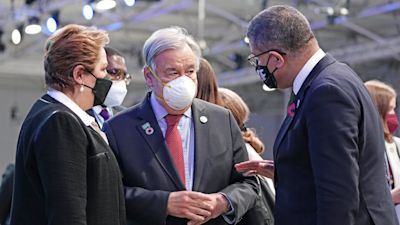COP26: 'Monumental challenge ahead' as climate change talks enter final day

The COP26 climate talks are entering their final scheduled day with the summit’s president warning there is still “a monumental challenge ahead”.
The talks are scheduled to finish at 6pm on Friday, but could overrun as negotiators come under pressure to resolve issues around finance for poorer countries, calls for accelerating the phase-out of fossil fuel subsidies and coal, and the efforts of countries to cut emissions in the 2020s.
The COP27 climate conference - what you need to know
What is COP27? When and where will it be?
What is COP27? When and where will it be?
Each year, the United Nations Framework Convention on Climate Change (UNFCCC) meets at what is called the Conference of the Parties (abbreviated as COP) to discuss the world's progress on climate change and how to tackle it.
COP27 is the 27th United Nations Climate Change Conference of the Parties summit which will be held in Sharm El Sheikh, Egypt from November 6-18.
Who is going?
Who is going?
Leaders of the 197 countries that signed the United Nations Framework Convention on Climate Change (UNFCCC) - a treaty that came into force in 1994 - are invited to the summit.
These are some of the world leaders that will be attending COP27:
UK Prime Minister Rishi Sunak is attending the conference, after initially saying he wouldn't as he was too busy focusing on the economy within his first weeks in office.
US President Joe Biden and his experienced climate envoy, John Kerry, will appear at the talks.
France President Emmanuel Macron will also be among the heads of state from around the world staying in Egypt.
King Charles III will not be attending COP27, despite being a staunch advocate for the environment. The decision was made jointly by Buckingham Palace and former prime minister Liz Truss.
Elsewhere, Russian President Vladimir Putin and his Chinese counterpart Xi Jinping will not attend the talks just as they decided to do for COP26.
What is it hoping to achieve?
What is it hoping to achieve?
1. Ensure full implementation of the Paris Agreement and putting negotiations into concrete actions - included within this is the target of limiting global warming to well below 2C.
2. Cementing progress on the critical workstreams of mitigation, adaptation, finance and loss and damage, while stepping up finance notably to tackle the impacts of climate change.
3. Enhancing the delivery of the principles of transparency and accountability throughout the UN Climate Change process.
As the talks entered the final stretch, COP26 president Alok Sharma warned: “We still have a monumental challenge ahead of us, but collectively we have no choice but to rise to that challenge and strain every sinew to achieve a timely outcome that we can all be proud of.
“Because ultimately, this outcome, whatever it is, will belong to all of us”.
A new version of the overarching deal that could be agreed at the summit in Glasgow was expected overnight into Friday, but had still not been published on the United Nations' website at 7am.
The first draft of the “cover decision” urges countries to “revisit and strengthen” targets for cutting emissions by 2030 in their national plans, to align them by the end of 2022 with the Paris goal of keeping temperature rises to “well below 2C” or to 1.5C, beyond which the worst impacts of climate change will be felt.
Scientists have warned that keeping temperature rises to 1.5C requires global emissions to be cut by 45% by 2030, and to zero overall by mid-century.
The failure of developed nations to deliver the long-promised $100 billion (£75 billion) in finance to poorer nations has been a major sticking point in the talks so far.
The document published on Wednesday includes a call for developed countries to at least double their collective provision of finance to help developing countries adapt to climate change, as part of scaling up funding for poorer nations to tackle the crisis and address loss and damage.
Some of the most vulnerable nations have raised concerns about the lack of detail.
It is thought the commitment to phase out fossil fuels, the first time this has appeared in such a text, is unlikely to make it into the final document, as an alliance of developing nations and emerging economies want commitments to phasing them out to be stripped from the cover agreement, arguing being asked to decarbonise without financial support will leave them trapped in poverty.
Speaking on Thursday, UN Secretary General Antonio Guterres emphasised that under current plans, the world is still on course for temperature rises well above 2C.
“Promises ring hollow when the fossil fuels industry still receives trillions in subsidies, as measured by the IMF, or when countries are still building coal plants, or when carbon is still without a price, distorting markets and investors decisions,” he said.
Mr Guterres added: “The announcements here in Glasgow are encouraging but they are far from enough.
“The emissions gap remains a devastating threat, the finance and adaptation gap represent a glaring injustice for the developing world.”